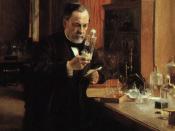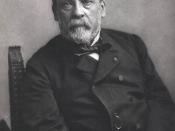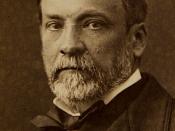PasteurizationPasteurization is the sterilization of liquids such as milk, juice, wine, and beer, as well as cheese.
The purpose of pasteurization is to destroy any potential disease causing and hazardous organisms. Pasteurization is important because it makes the liquids we drink safe for our consumption; it keeps the liquids lasting longer; it prevents the liquids from spoilage (ex: milk); and it ensures the quality of the products.
The name pasteurization came from the French scientist Louis Pasteur.
Louis Pasteur was born in Dole France on December 27, 1822; he was married to Marie Laurent and had five children. Three of his children died from typhoid fever, leading him to saving peoples lives from diseases. He attended school at Besancon College Royal de la Franche and graduated in 1842 with honors in physics, mathematics, Latin, and drawing. He then attended another school called Ecole Normale to study physics and chemistry specializing in crystals.
He had many accomplishments throughout life. First, he changed hospital practices by minimizing the spread of disease caused by microbes. Second, he discovered that weakened forms of a microbe could be used as immunization against more virulent forms of the microbe. Third, he discovered that agents so small transmitted rabies, they could not be seen under a microscope. That revealed the world of viruses. He then developed a vaccine for dogs from getting rabies and to treat humans bitten by dogs with rabies. Finally, in 1876 Louis Pasteur discovered that undesired fermentation could be prevented in wine and beer by heating it up to a certain temperature. Later pasteurization was used on milk, after being heated it was sealed air tight and shipped without spoilage.
Louis Pasteur was committed to science research. He worked with high intensity. Most of his work was done in private isolation,


